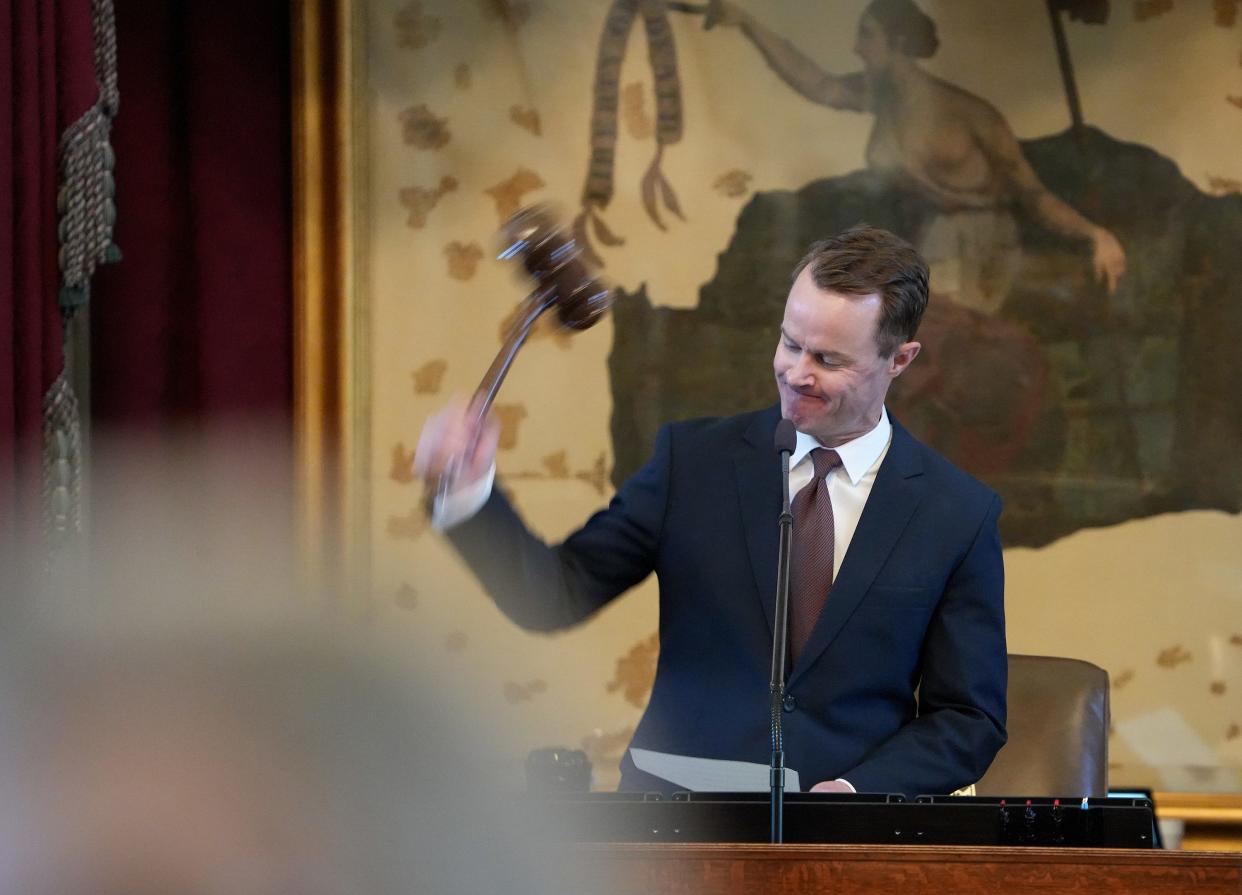Is the Texas Legislature bucking tradition and now taking political cues from Washington?

- Oops!Something went wrong.Please try again later.
- Oops!Something went wrong.Please try again later.
Fresh from being awarded a second term as the presiding officer of the Texas House back in January, Speaker Dade Phelan made an unflattering reference to the dysfunction that at the time was crippling Congress.
"Words of caution," Phelan told the newer members of the House as it prepared for the 20-week regular session of the Legislature, "please do not confuse this body with the one in Washington, D.C."
The Beaumont Republican, who worked as a legislative staff member before being elected as a freshman House member in 2014, was parroting a decades-old notion of Texas exceptionalism that is pretty much accepted as fact among the political class in Austin: In Washington, Democrats and Republicans fight and gripe; in Texas, Republicans and Democrats get things done.
It's an oversimplification, and it's not nearly as true here as it used to be. But it endures as a talking point for political leaders in both camps whenever it suits their purpose.
On its face, Phelan's comment from the rostrum of the House chamber all those months ago sounded like just another homage to bipartisanship because he was under pressure from a conservative bloc of his fellow Republicans to end the decades-long tradition of awarding committee chairmanships and other positions of chamber leadership to at least some members of the opposition party.
That doesn't happen in Congress or in most other state legislatures.
But the infighting and backbiting the speaker alluded to in Washington wasn't the traditional red-blue one-upmanship. It was all red-on-red. Dominating the D.C. headlines back then was the almost comic effort by California Congressman Kevin McCarthy to corral the Republican votes he needed to make him speaker of the U.S. House.
He finally got there, but it took him 15 tries and so many side deals with hard-line House GOP conservatives that his undoing was almost preordained.
McCarthy was again dominating the political headlines when Phelan gaveled the Texas House to order for the special session Monday. But this time the storyline wasn't how long it took the Californian to secure power; it was how fast it was stripped from him.
And the annoyance of a buzzing mosquito from Texans on the right that Phelan was facing in January had escalated to the clatter of a chipper-shredder by October. And his old Texas exceptionalism platitude gave way to the slash of a switchblade.
The speaker's chief antagonist, conservative Lt. Gov. Dan Patrick, called on Phelan to resign for allowing the House to impeach Attorney General Ken Paxton soon after the Senate, which Patrick runs, voted to acquit. And Republican state Rep. Tony Tinderholt, who unsuccessfully challenged Phelan for speaker in January, attempted use the Paxton matter to embarrass the House leader in front of his own chamber.
Phelan returned fire against Patrick by seeking to shame him into relinquishing $3 million in political donations from the hard-right Defend Texas Liberty PAC after its leader recently met for about six hours with white supremacist and Nazi sympathizer Nick Fuentes in Fort Worth.
Patrick called the meeting a "blunder" but said he saw no reason to part with the campaign cash.
Then Phelan bluntly, and publicly, informed Tinderholt he would no longer have the House privilege of making "parliamentary inquiries" such as the one related to the Paxton matter, saying such actions are time-wasting and "dilatory." That further angered conservatives, some of whom accused the speaker of imposing a "gag order" on a political opponent.
All this comes as Gov. Greg Abbott is seeking to unify the Republican majorities in both legislative chambers to push through his plan to allow tax dollars to be diverted to offset expenses for private education. That was a heavy lift going in because two dozen GOP House members have signaled their misgivings. And Republicans' internecine warfare in the Capitol isn't lightening the governor's load.
The disarray in Austin mirrored that in Washington as the party headed into the weekend amid uncertainty that anyone in the U.S. House could cobble together the votes needed to become McCarthy's successor.
A generation ago, when the Republican ascendency in Texas was barely off the launching pad, then-Lt. Gov. Bob Bullock, a Democrat, made clear that it would be an epic mistake for the first GOP majority in the Texas Senate since Reconstruction to sideline him and run the chamber along party lines.
"We have seen what happens in Washington when they do that," Bullock said after the 1996 election, which erased his Democratic advantage in the Senate. "It will be over my dead body before that ever happens in this state."
The Republican senators heeded his warning, and the Democrat continued to call the shots in the upper chamber until his retirement two years later.
Today, Bullock's "dead body" is buried in the Texas State Cemetery, exactly one mile east of the Capitol. And buried with it, so it seems, is his warning about Texas taking its political cues from Washington.
This article originally appeared on Austin American-Statesman: Texas bucking tradition and now taking political cues from Washington

